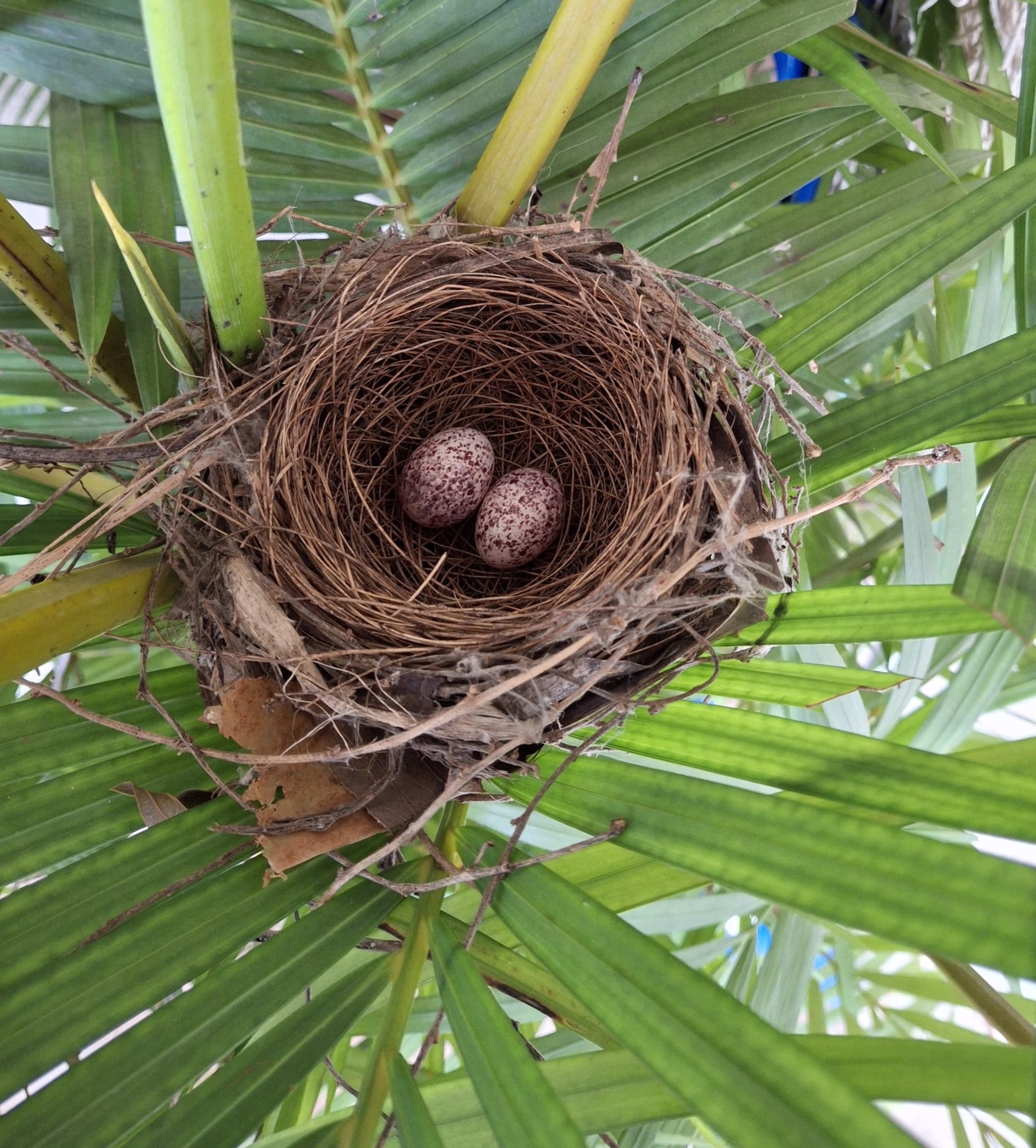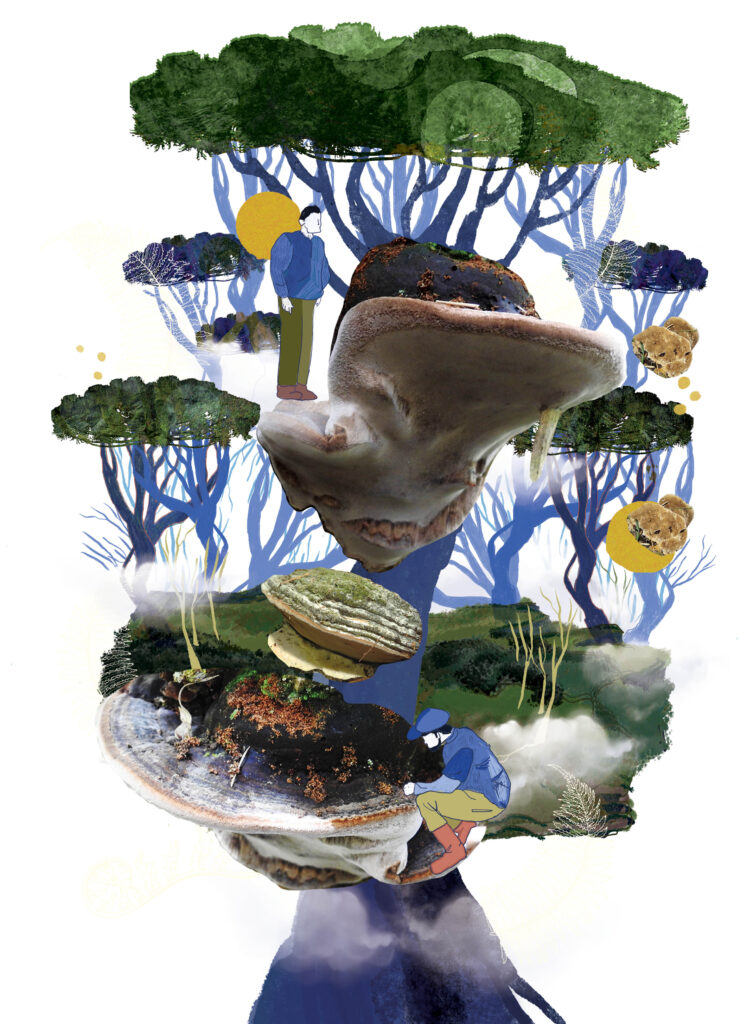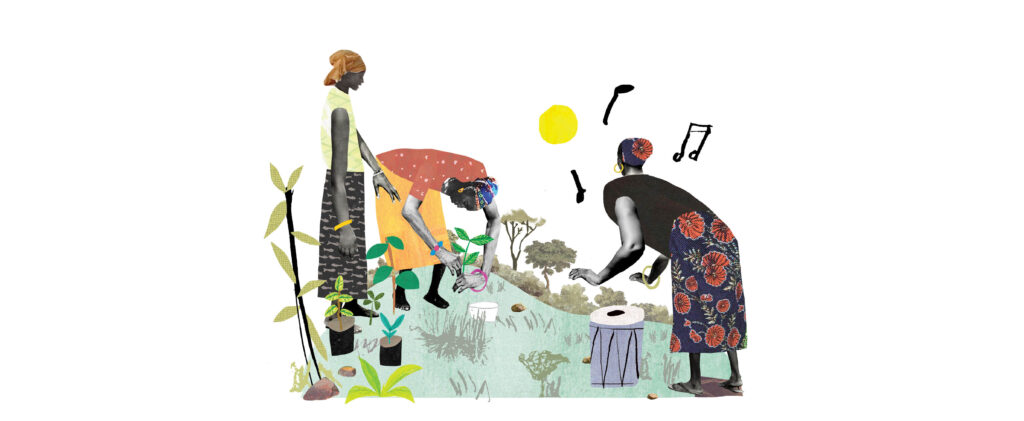What once was a place vibrant with life now holds a tranquil stillness, inviting us to listen closely and embrace the quiet moments that linger. Leonard Cohen’s words echo in my mind:
“Listen to the hummingbird
Whose wings you cannot see.
Listen to the hummingbird
Don’t listen to me.”
It was my elder sister, Vidhatri, who first noticed the scouting bulbul pair. We had just moved into the house in the hot summer of May, in the bustling city of Bangalore. While the house was bare, waiting to be lived in, the terrace was a sea of green with hibiscus and white roses, a tank of water lilies with fish in it, along with other plants I have yet not learnt the names of. In the corner, as soon as you opened the door, the tall areca palm greeted you with its leaves wide open.
One scorching afternoon, a month after we had moved in, we opened the terrace door to see a rather chirpy pair of bulbuls on the clothesline, hopping around and inspecting the plants. It was nothing we hadn’t seen before, given how common bulbuls are, and yet we were in complete awe. Over the next few days, we cautiously opened the door as soon as they broke into song and argued about which one was male and which was female, hoping to find some sort of marking that differentiated them. Neither of us were seasoned birdwatchers and thanks to recent technological advancements, we scrolled endlessly through bird identification apps and bulbul blogs and stories on the internet. Being the amateurs we were, we still couldn’t tell the red-whiskered male from the female apart. Eventually, that did not matter.
By mid-June, the pair chose the areca beside our door to nest in. It was a spot that hid them from the exposed terrace and being under the shed, protected them from the rain. Not wanting to disturb them as they darted from one plant to another, we barely opened the door to look at them.
Hoping to catch a glimpse, one noon, I cracked open the door just enough to peek through. The birds were not there. I walked to the areca and in their absence something new had appeared in the nest—two tiny, brown speckled eggs! I called for Vidhatri excitedly, who took it upon herself at that very moment to document the lives of this new family that had made this place our shared home.
The bulbuls returned regularly, taking turns incubating the eggs, as the other went off in search of food. As a little experiment of our own, we left them some water but they remained doubtful of our offerings.
About two weeks after the discovery of the eggs, on yet another occasion when the nest was unattended, I dared to peek into it and saw two tiny blobs of pinkish red. Surely they were the most odd-looking little bird babies, I thought to myself, as they moved their tiny arms around and touched each other and lay snuggled in the little nest, eyes tightly shut to the world—and that was, perhaps, the most beautiful thing that I had ever seen! Minutes later the bulbuls returned with their loud warning calls.
The next few days were filled with their chirps and our excited whispering. We watched the parent bulbuls dart tirelessly back and forth with tiny insects and worms in their beaks. The chicks demanded a meal every few hours. We had taken to leaving fruit—grapes, jamun, anything we thought they would enjoy. The tired parents accepted the fruit to feed the ever-hungry chicks. Every morning, I could swear they had grown a tiny bit more than they had yesterday. By the end of June, they barely fit in the once spacious nest and had started sprouting feathers. They would react to the softest of footsteps, their mouths wide open and soundless, as they expected the return of the worm bringers. Trust me, the sight was hilarious!
The birds would never feed the chicks while we were around. Instead, they would perch on a nearby plant, chirping loudly, urging us to back off. Only when the coast was clear, did they swoop down to feed their young.
As July brought light rain, the bulbuls’ choice of the areca plant beside our door started making perfect sense. It was the best weather for snuggling in and enjoying the rain. The chicks slept and demanded food for most part of the day. The parents took shifts to fulfil all their demands. In their absence, we felt the strong urge to be the chicks’ guardians. They would be ready any day to flap their tiny wings and leave the nest.
The experience breathed new life into us until one morning in early July, one of the chicks went missing. Vidhatri and I searched the terrace frantically, hoping to find it. We thought it had attempted to fly and must be alone somewhere, in need of our help, but there were no signs, no chirps to indicate its presence. We told ourselves that perhaps the parents had moved it to a safer place, disturbed by our presence.
The next morning, I woke to the sound of Vidhatri’s panicked voice. “Get up!” she said, tears streaming down her face. “The other chick—it’s dead.” I scrambled out of bed and followed her out onto the terrace. There, lying among the plants was the second chick, its tiny body lifeless. Its feet were wrapped with the twigs from the nest, as if it had struggled to hold on. Ants had begun to gather around it. I stood there in shock. Surely, I must be dreaming? Perhaps I would wake up any moment and see the chick in the nest, flapping its wings. The air felt heavy all around me.
We speculated about what might have happened. Perhaps it was a crow or a black kite, both of which we had seen circling the neighbourhood. Or maybe it was one of the stray cats. The mystery remained. It is difficult to be angry and remain angry when you don’t know what you’re angry at. “It is the circle of life” we were told by family and friends. That noon, the bulbuls sat on our grilled door, so close that we could touch them and then they broke into a song, almost as if mourning their babies’ deaths. We were speechless.
But this is not a sad story. It is a story about opening our hearts and homes to the wonders of nature. In the busy city of Bangalore, where the noise often drowns out the little chirps, our terrace became a quiet refuge. I now spend my days watching the butterflies flutter from a bright flower to another. If you’re silent for a moment, you can still hear the song of the bulbuls.






